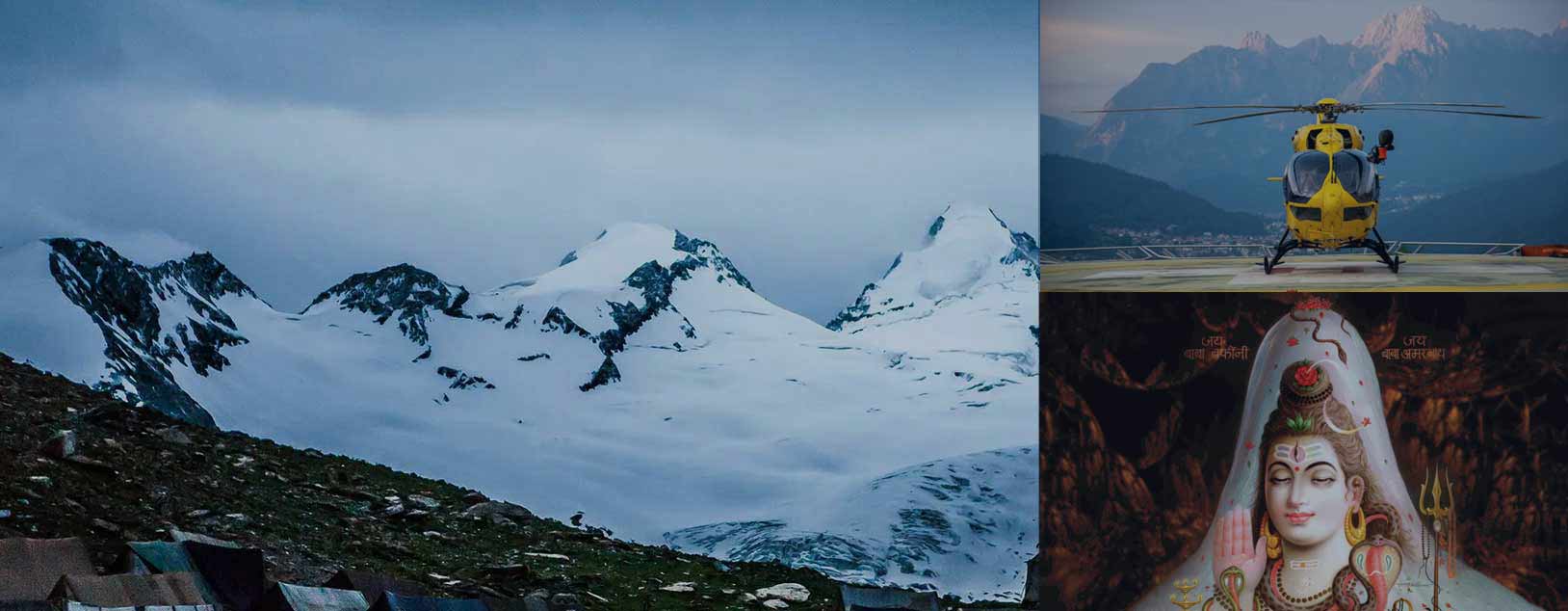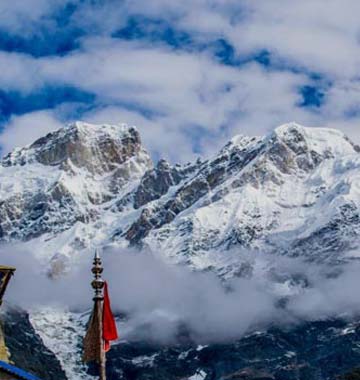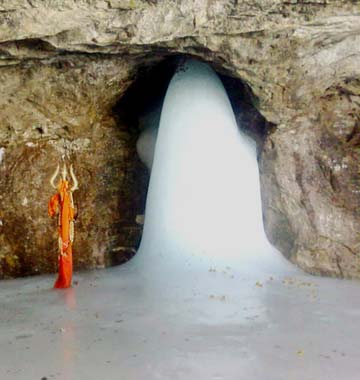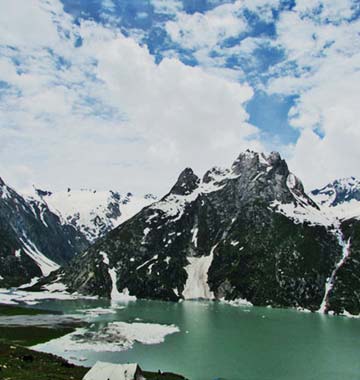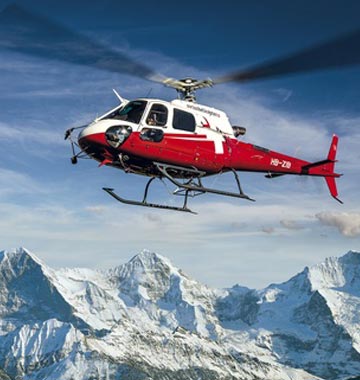Amarnath Yatra by Helicopter Packages 2025
Amarnath Yatra by Helicopter for 4 Days
2 Nights 3 Days |
Sonmarg - Srinagar - Neelgrat - Panjtarni
Enquiry Now View Package DetailsAmarnath Yatra By Helicopter Tour Package
3 Nights 4 Days |
Srinagar - Amarnath Cave - Srinagar
Enquiry Now View Package DetailsAmarnath Yatra by Helicopter from Baltal
2 Nights 3 Days |
Sonmarg - Srinagar - Amarnath Cave
Enquiry Now View Package DetailsAmarnath Yatra by Helicopter for 6 Days
5 Nights 6 Days |
Sonmarg - Srinagar - Gulmarg - Pahalgam
Enquiry Now View Package DetailsAmarnath Yatra by Helicopter 2025
Amarnath Yatra is among India's most sacred pilgrimages, where thousands of pilgrims visit the sacred Amarnath Cave to see the naturally created ice Lingam of Lord Shiva. The traditional pilgrimage involves trekking through the difficult Himalayan landscape, but through Amarnath Yatra by Helicopter, pilgrims can now undertake the yatra in a short, comfortable, and safe manner.
At Amarnathyatrabyhelicopter.in, we offer convenient Amarnath Yatra by Helicopter Booking, budget-friendly packages, and 24/7 support to make your journey smooth and divine in 2025.
Amarnath Yatra by Helicopter Booking 2025
We provide personalized Amarnath Yatra by Helicopter Packages so that the travel is hassle-free and convenient. Our packages have helicopter tickets, VIP Darshan, accommodation, meals, and local transportation.
Amarnath Yatra by Helicopter provides a fast, convenient, and safe means for pilgrims to see the sacred Amarnath Cave, where Lord Shiva's naturally occurring ice Shiva Lingam abides. Rather than walking through treacherous mountainous trails, pilgrims may now take advantage of helicopter travel from Baltal or Pahalgam and make the experience available to everyone across all ages.
Book Amarnath Yatra by Helicopter Tour Package with us
We offer hassle-free Amarnath Yatra by Helicopter booking, low-cost tour packages, and end-to-end travel assistance at Amarnathyatrabyhelicopter.in so that you have a trouble-free pilgrimage experience. Our helicopter rides include VIP Darshan facilities, where devotees can obtain blessings without waiting in lines.
Why Choose Amarnath Yatra by Helicopter Tour Package?
The Amarnath Yatra is a spiritually uplifting pilgrimage that involves traversing the craggy Himalayan landscape to find the holy Amarnath Cave, where Lord Shiva's ice Lingam is revered. Pilgrims traditionally walk for days to undertake this journey. But Amarnath Yatra by Helicopter Tour Package provides a fast, secure, and convenient option, making the pilgrimage easier for pilgrims of all ages.
Top Reasons to Choose Amarnath Yatra by Helicopter Tour
1. Faster & Time-Saving
Conventional trekking takes 3-5 days, while the helicopter service reaches the destination in merely a few hours. Best suited for elderly people, families, and believers with time constraints.
2. Safe & Comfortable Journey
Evades the physically demanding trek along hilly mountain terrain. Minimal chance of altitude sickness or bodily fatigue.
3. Multiple Route Options
Select from helicopter services through Baltal or Pahalgam.
Baltal Route: Shorter, with a 5-6 km hike from Panchtarni.
Pahalgam Route: Longer but provides a picturesque ride.
4. VIP Darshan Access
Helicopter travelers tend to get priority for Darshan, minimizing long waiting times at the cave. A quicker and quieter spiritual experience.
5. Affordable & Flexible Packages
Various Amarnath Yatra by Helicopter Packages to cater to various budgets. Covers helicopter tickets, food, lodging, and transport.
6. Ideal for Emergency Situations
If there is bad weather or health issues, it is quicker and easier to return by helicopter.
Book Your Amarnath Yatra by Helicopter Tour Today!
With Amarnathyatrabyhelicopter.in, you can easily plan your spiritual journey and enjoy Lord Shiva's blessings. For the greatest offers on pilgrimage packages and helicopter tickets, get in touch with us right now.
Amarnath Yatra by Helicopter Booking 2025 – How to Book?
Helicopter Booking for Amarnath Yatra 2025 is now available! As the demand is greater, it is recommended to book earlier to hold your place. Simply follow the easy steps:
Steps for Amarnath Yatra by Helicopter Booking 2025
Select Your Route –Either Baltal or Pahalgam for your helicopter takeoff.
Choose Your Package –Pick a helicopter-only ticket or a Full Amarnath Yatra by Helicopter Package with stay and food.
Register for the Yatra – All pilgrims need to undergo compulsory registration and take a medical fitness certificate.
Confirm Your Booking –Pay online and get your e-ticket.
Get Ready for Your Journey – Fly to your assigned helipad and take a sacred journey to Amarnath Cave.
Amarnath Yatra Helicopter Booking Price 2025 – Routes & Cost
The Amarnath helicopter operates from two boarding points—Neelgrath (Baltal) and Pahalgam. Two routes provide helicopter transfers to the last stoppoint of Panchtarni before the short trek to Amarnath Cave Temple.
1. Amarnath Yatra Helicopter Booking Price from Baltal (Neelgrath Route)
The Baltal route is the shortest and cheapest mode of helicopter travel to Amarnath. Helicopters fly from Neelgrath Helipad, which is near Baltal, and transport pilgrims to Panchtarni in a mere 7-10 minutes. From Panchtarni, pilgrims have to walk or ride on pony or palki for a distance of 5-6 km to reach the Amarnath Cave.
One-Way Helicopter Fare from Neelgrath to Panchtarni: ₹3,500 – ₹4,500
Round-Trip Helicopter Fare from Neelgrath to Panchtarni and back: ₹7,000 – ₹9,000 per head
Flight Duration: 7-10 minutes
Baltal route is greatly favored by pilgrims in search of a fast and inexpensive travel. Owing to the fact that Panchtarni to the Amarnath Cave is not so far, it is a good choice for devotees who are willing to undertake a moderate trek.
2. Amarnath Yatra Helicopter Booking Price from Pahalgam
The Pahalgam trek is the classical trek to Amarnath Cave and is longer and more picturesque than the Baltal trek. Helicopter facilities are available from the Pahalgam Helipad to Panchtarni, which cuts short the otherwise lengthy 36 km trek to only a 5-6 km trek. This trek is suitable for pilgrims who want to appreciate the splendor of the Himalayan vistas as well as the convenience of a relatively easier ride.
One-Way Helicopter Fare from Pahalgam to Panchtarni: ₹4,500 – ₹6,000 per person
Round-Trip Helicopter Cost from Pahalgam to Panchtarni and return: ₹9,000 – ₹12,000 per person
Flight Duration: 15-20 minutes
The Pahalgam path is slightly costlier than the Baltal path, but it is easier for pilgrims who wish to skip more strenuous walks. As Pahalgam is a well-touristed location, numerous pilgrims use this path in order to enjoy further sightseeing and a peaceful mode of transport.
Note: Government rules, availability, and demand can all affect prices. Before completing your reservation, it is essential to verify the most recent Amarnath Yatra Helicopter Booking Price 2025.
Book Amarnath Yatra by Helicopter Tour Packages 2025 with us
Amarnath Yatra by Helicopter Packages 2025 provides an easy and convenient means for pilgrims to take their holy pilgrimage to the Amarnath Cave Temple. All that is required for a smooth pilgrimage is available in these packages, including helicopter tickets, accommodation, food, transportation, and VIP Darshan arrangements. Irrespective of whether you are coming from Baltal (Neelgrath) or Pahalgam, these packages meet all your requirements, providing a safe, convenient, and spiritual experience.
Amarnath Yatra by Helicopter Package Inclusions
1. Helicopter Tickets (Round Trip / One-Way)
Helicopter flight from Baltal (Neelgrath) or Pahalgam to Panchtarni and return
Comfortable and safe travel, cutting down on travel time from days to minutes
Well-trained pilots and well-maintained aircraft for a safe flight
2. Accommodation
Luxury hotels / deluxe hotels / budget guest houses as per package choice
Comfortable rooms with latest amenities
Facilities available in Srinagar, Sonmarg, Baltal, or Pahalgam
Tent accommodation options nearby the cave for overnight stay
3. Meals (Breakfast, Lunch & Dinner)
Pure vegetarian food arranged during the trip
Clean and freshly prepared food at specific stops
Breakfast and dinner at hotels with packed lunch for yatra
4. VIP Darshan & Priority Pass
Arrangement for VIP Darshan at Amarnath Cave
Spare yourself the long queues and have darshan without any waiting time
Help from local guides to ensure smooth experience
5. Transportation Services
Pick-up and drop from Srinagar Airport / Jammu Airport
Inter-helipad, hotel, and yatra origin transfers
Easy transportation through SUVs, Tempo Travelers, or private cabs
6. Medical Assistance & Oxygen Support
Emergency medical assistance during the entire trip
Oxygen cylinders to take care of high-altitude sickness
First-aid kits at helipads, hotels, and base camps
7. Palki / Pony Services (Optional Add-On)
Support for booking palkis or ponies to trek from Panchtarni to the cave
Fee for palki or pony is additional but can be pre-booked
8. Srinagar sightseeing (Optional in Extended Packages)
Travel to popular tourist attractions in Srinagar such as Dal Lake, Shankaracharya Temple, Mughal Gardens
Stay in a Houseboat with Shikara ride experience on Dal Lake
Factors Affecting Amarnath Yatra by helicopter cost
A few factors determine the Amarnath Yatra by helicopter price every year, such as:
1. Early Booking vs. Last-Minute Prices:
Helicopter ticket costs are typically lower when reserved in advance. Reservations last minute can be more expensive since there is high demand and low availability.
2. Off-Peak vs. Peak Travel Dates:
Amarnath Yatra is held between June and August, peak days being around Shravan Purnima (Raksha Bandhan). Tickets on peak pilgrimage days could be higher than for the initial or end yatra time.
3. Route Selection:
The Baltal track is more affordable than the Pahalgam track because it takes a shorter flight time. Pilgrims who want a low-cost solution should book from Neelgrath (Baltal) to Panchtarni.
4. Weather Conditions & Rescheduling:
Adverse weather conditions may lead to flight delays or cancellations, resulting in possible price fluctuations. Pilgrims are requested to check the weather forecast prior to booking their helicopter tickets.
5. Package vs. Individual Ticket Booking:
Numerous travel companies have Amarnath Yatra helicopter packages with helicopter tickets, lodging, food, and VIP darshan booking included. Though convenient, they could be more expensive than buying only helicopter tickets.
Dates for Amarnath Yatra by Helicopter 2025
Amarnath Yatra is one of the holiest pilgrimages in Hinduism, bringing thousands of pilgrims annually to avail themselves of the blessings of God Shiva at the sacred Amarnath Cave. Situated in Jammu & Kashmir's Himalayan terrain, this holy place boasts the naturally occurring ice Shiva Lingam, believed to manifest and decrease according to the phases of the moon.
Amarnath Yatra 2025 will be performed according to the official declaration made by the Shri Amarnath Shrine Board (SASB), which controls the pilgrimage annually. Devotees await the Amarnath Yatra opening dates 2025 eagerly to organize their religious pilgrimage.
The Amarnath Yatra opening and closing dates for 2025, registration procedures, travel routes, helicopter services, and crucial advice for a trouble-free pilgrimage are all covered in depth in this book.
Amarnath Yatra 2025 Opening & Closing Dates
Amarnath Yatra 2025 will likely begin in June 2025 and end in August 2025. Official announcement of dates will be made by the Shri Amarnath Shrine Board (SASB).
Amarnath Yatra 2025 Dates:
Opening Date: Most probably in the last week of June 2025
Closing Date: Probably in the third week of August 2025 (on Shravan Purnima)
The yatra typically continues for around 45-50 days and ends on the auspicious day of Raksha Bandhan (Shravan Purnima). Official dates will be announced in early 2025.
Important: It's best to book your pilgrimage well in advance of time to arrange registrations, accommodations, and helicopter tickets.
Tour to Amarnath Yatra by Helicopter
Amarnath Yatra is one of the biggest religious pilgrimages in Hinduism, taken by thousands of pilgrims annually to worship the divine Amarnath Cave, where a naturally formed ice Shiva Lingam is seen. Located in the Himalayas of the state of Jammu & Kashmir, the holy pilgrimage is linked to Lord Shiva and is said to have been the site where he taught the sacred of immortality to Goddess Parvati. Pilgrims eagerly await the Amarnath Yatra opening dates 2025 to start their journey to obtain divine blessings.
Amarnath Yatra Helicopter Booking Price 2025
The Amarnath Yatra 2025 will start from June 2025 and extend for about 45-50 days, to end on the sacred day of Raksha Bandhan (Shravan Purnima) in August 2025. The dates for the yatra will be decided by the Shri Amarnath Shrine Board (SASB), whose duty is organization and smooth facilitation of the yatra. The trek is in a tough high-altitude area and hence requires pilgrims to be fit in body and in good health before undertaking the trip.
In order to join the Amarnath Yatra 2025, all pilgrims will have to mandatorily register and procure a Compulsory Health Certificate (CHC) as directed by the rules laid down by the Shri Amarnath Shrine Board. Registration is possible online via the official SASB website or offline from designated bank branches like J&K Bank, Punjab National Bank, and Yes Bank. Pilgrims are also supposed to provide medical fitness certificates given by licensed physicians to prove their capacity to endure the extreme weather and high-altitude conditions of the Amarnath trek.
Travel to Amarnath
There are two principal paths to the Amarnath Cave Temple – the Baltal Route and the Pahalgam Route. The Baltal Route, originating from Neelgrath, is the shorter and steeper way, a distance of 14 km, and facilitates pilgrims to make the yatra in a day. The route suits those who would rather have a faster journey. The Pahalgam Route, however, is a longer and more picturesque route, measuring well over 36 km and requiring 2-3 days of walking to accomplish. Although the route has a gradual climb, it is chosen by those who want to go through the authentic yatra with stunning vistas of the Himalayas.
For those who do not want to take the arduous trek, Amarnath Yatra by Helicopter is a great option. Helicopter facilities are operated from Baltal (Neelgrath) and Pahalgam to Panchtarni, cutting down on travel time drastically. The helicopter ride from Baltal to Panchtarni is about 7-10 minutes, and the Pahalgam to Panchtarni route is about 15-20 minutes. From Panchtarni, the cave is approximately 5-6 km distant and can be accessed on foot, by pony, or on palki services. The Amarnath Yatra helicopter ticket price 2025 depends on the route taken, with prices generally costing between ₹7,000 to ₹12,000 for an onward-round trip ticket. Pilgrims should book their helicopter tickets in advance of high demand.
Amarnath Yatra Helicopter Booking 2025
Besides the helicopter-only tickets, other Amarnath Yatra by Helicopter Packages 2025 are offered so that pilgrimage can be made comfortable. These packages typically comprise helicopter tickets, stay, meals, transport facilities, and VIP Darshan arrangements. Based on the inclusions, the packages can cost between ₹14,000 and ₹30,000 per pilgrim. Pilgrims availing themselves of these packages enjoy a hassle-free and well-organized journey without the tensions of arranging things at the last moment.
As the Amarnath Yatra is conducted in a high-altitude and difficult terrain, pilgrims need to take precautions. It is advisable to carry warm clothing, rain gear, trekking boots, first aid kits, and dry food items. Proper acclimatization is essential to prevent altitude sickness and adhere to all safety instructions released by the authorities. The yatra is well-guarded by security personnel, and all devotees need to go through several security checks before embarking on their pilgrimage.
Amarnath Yatra By Helicopter Package
The Amarnath Yatra 2025 will see a huge rush of pilgrims, hence planning in advance is essential. Advance booking of helicopter tickets, accommodations, and registrations guarantees a smooth trip. Since this is a spiritually relevant yatra, the devotees must also plan mentally and spiritually, performing prayers and meditation prior to undertaking their holy journey.
For those who intend to perform the Amarnath Yatra by Helicopter 2025, advance bookings are advisable in order to avail the best prices and availability. Pilgrims can book their Amarnath Yatra helicopter tickets and tours with authorized agents or online sites such as Amarnathyatrabyhelicopter.in, which provides secure and economical travel services.
By deciding to go for the Amarnath Yatra 2025, pilgrims will have a heavenly and memorable journey to the holy residence of Lord Shiva, praying for prosperity, health, and spiritual development. The enchanting natural scenery of the Himalayas, along with the holy atmosphere of the Amarnath Cave, makes this journey a really once-in-a-lifetime experience.
FAQs on Amarnath Yatra by Helicopter 2025
Q1. Why is taking a helicopter during Amarnath Yatra beneficial?
Taking a helicopter ride for Amarnath Yatra has several advantages:
Time-saving – Helicopter travel cuts down the time of travel from 2-3 days to merely a few hours.
Less physical strain – Suitable for elderly citizens and those who cannot walk long distances.
Safe and convenient – Evades the hazards of high-altitude trekking.
Quick darshan – With the helicopter facility, you can finish the yatra in a day.
Q2. Is a permit or special registration required for Amarnath Yatra 2025?
Yes, all the pilgrims need to undergo Amarnath Yatra registration from the Shri Amarnath Shrine Board (SASB) and obtain a Compulsory Health Certificate (CHC) from medical authorities prior to booking helicopter tickets.
Q3. Can we book Amarnath helicopter tickets offline?
Helicopter tickets for Amarnath Yatra are available to book online from official sources, but offline booking may be made at specific counters with limited numbers. Offline tickets are, however, subject to availability, so advance booking is strongly advised to be done online.
Q4. What does the Amarnath helicopter tour package include?
A standard Amarnath Yatra by helicopter package consists of:
Helicopter tickets (one-way or round-trip)
Stay in Baltal/Pahalgam or Srinagar
Food (breakfast, lunch, dinner)
VIP Darshan facility at Amarnath Cave
Airport to helipad and back transfers
Medical care during the yatra
Q5. How long is the trek from Panchtarni to Amarnath Cave after the helicopter ride?
After you land at Panchtarni in the helicopter, you have to undertake a 5-6 km walk to arrive at the Amarnath Cave. Pilgrims can walk, take a pony on hire, or take a palki (palanquin) if they prefer comfort.
Q6. Is there any age restriction for making a booking for Amarnath Yatra by helicopter?
Yes, according to SASB guidelines:
Children under 13 years and senior citizens over 75 years are not permitted for Amarnath Yatra.
Pregnant women (over 6 weeks) are also not allowed to take the pilgrimage.
Q7. Can I bring luggage on the helicopter?
Helicopter services permit limited baggage. Typically, only 5-7 kg per person is allowed. Extra baggage and large luggage need to be left at the hotel or base camp.
Q8. What do I need to take along for the Amarnath Yatra helicopter ride?
Items to pack for Amarnath Yatra by helicopter:
Valid ID proof & Yatra permit
Woolens (jackets, gloves, caps)
Trekking shoes
First-aid kit & medicines prescribed
Raincoat/Umbrella (owing to inclement weather)
Dry fruits/snacks & water bottle
Q9. Are there toilets at the helipads and Panchtarni?
Yes, there are basic toilet facilities at Baltal, Pahalgam, and Panchtarni helipads. But because Panchtarni is at a high altitude, there might be less facility compared to the base camps.
Q10. Is it possible to book Amarnath helicopter tickets for a group?
Yes, group bookings can be made for Amarnath Yatra by helicopter, but subject to limited availability. Booking in advance is recommended to ensure tickets for all members on the same date and flight.
Q11. What if my helicopter flight is cancelled due to bad weather?
If a flight is cancelled because of bad weather, you can:
Reschedule to the next available flight (subject to availability).
Request a refund (subject to operator's policy).
Pilgrims are advised to have buffer days in their itinerary to account for delays.
Q12. Is there a medical check-up prior to Amarnath Yatra?
Yes, each pilgrim needs to acquire a Compulsory Health Certificate (CHC) from a qualified doctor prior to enrolling for the yatra. Since Amarnath Yatra covers high-altitude terrain, a medical clearance for all devotees is essential.

